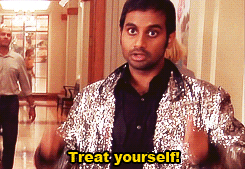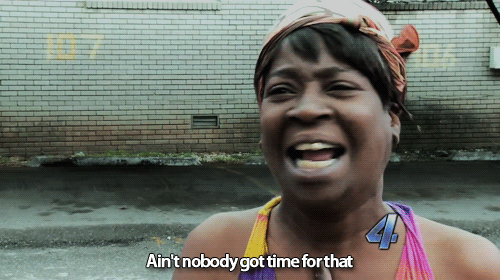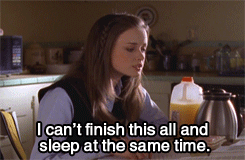There is a lot of stress building up as we move into finals week, so I have started compiling a list of ways to combat that stress and use time productively.
- I normally try not to reward myself for finishing another page on my essay or finishing a worksheet, by watching an episode of TV or scrolling through Facebook, because it often disrupts my thought process. But I feel that in times where stress is high and you’re working on so many things at one time, it can help to give yourself a break once you meet some sort of deadline that you’ve set for yourself. It is also proven that you should not study for too long without a break, as your brain can only focus for so long on the same thing. Taking short breaks will keep your mind fresh and help deter writer’s block and other lethargic thought processes. This leads me to my next point…
.gif)
- Set small deadlines for yourself. If you can make some sort of schedule that plans out small workloads for each day leading up to a final exam or paper, it will make everything you have to accomplish seem much more manageable. In order to organize yourself, it often helps to write down everything you want to get done and then write out when you will do each item on your list. This always helps relieve stress for me because I generally only have one thing to do on each day leading up to an exam and then I am not cramming.
- Besides your small rewards for meeting smaller deadlines, it is so important to take time to relax. It may be hard to find the time to do so, but it is very beneficial in the long run. Allowing time for your brain to rest, allowing yourself to think and talk about something that is not directly related to your studies, can help rejuvenate your brain.

- Eat well and get some exercise! Food and physical activity can help reduce stress so much. Exercising will help produce endorphins, which are natural mood elevators, while also reducing the cortisol levels. Certain foods can make you feel bloated and uncomfortable after you eat, which makes it harder to study and stay focused. Eating protein will help keep your brain sharp and fruits and veggies will help keep your eyes focused.

- Make sure you are drinking water! I always seem to have a problem with this and find that I feel so much better when I drink more water. Whether or not I’m actually less stressed is questionable, but I do feel good about drinking something that I know is healthy.

- Stick to your schedule once you’ve made it. It’s so easy to forget about it or lose yourself in other tasks when there’s a lot going on, but making sure you follow your list for the day will help make sure that you get everything done. This will help reduce stress, simply because you aren’t waiting until the last minute to accomplish these tasks.
Have any tips for the weeks leading up to finals? Share/comment below!

















